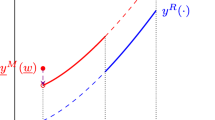Abstract
This paper develops a model ofinter vivos gifts and bequests in a setting of moral hazard and adverse selection. Altruistic parents do not perfectly know how much effort their children make to earn their living, nor do they know their true level of ability.Inter vivos gifts take place prior to the realization of the children's earnings whereas at the moment of bequests, parents do observe them. We show that an optimal transfer policy generally uses a mix ofinter vivos gifts — deemed as more efficient — and bequests — deemed as more redistributive.
Similar content being viewed by others
References
Becker G (1991)A treatise on the family. Harvard University Press, Cambridge
Becker G, Tomes N (1986) Human capital and the rise and fall of families.Journal of Labor Economics 4:S1-S39
Bernheim BD, Shleifer A, Summers LH (1985)The strategic bequest motive. Journal of Political Economy 93:1045–1076
Bruce N, Waldman M (1990) The rotten kid theorem meets the Samaritan's dilemma.Quarterly Journal Economics 105:1165–1182
Cigno A (1991)Economics of the family. Clarendon Press, Oxford
Gotman A (1988)Hériter. PUF, Paris
Joulfain, D (1993) The distribution and division of bequests in the U.S. evidence from the collation study. Mimeo
Linbeck A, Weibull JW (1988) Altruism and time consistency: the politics of fait accompli.Journal of Political Economy 96:1165–1182
Masson A, Pestieau P (1991) Types et modéles d'héritage et leurs implications.Economie et Prevision 100–101:31–72
Masson A, Pestieau P (1995) Bequests motives and models of inheritance: a survey of the literature. Mimeo, Université de Liège
Richter WF (1992) Bequeathing like a principal, University of Dortmund. Mimeo
Stiglitz J (1982) Self-selection and Pareto efficient taxation.Journal of Public Economics 17:213–240
Shapiro C, Stiglitz JE (1984) Unemployment equilibrium as a worker discipline device.American Economic Review 74:433–444
Author information
Authors and Affiliations
Additional information
We are thankful to Allessandro Cigno, Jacques Cremer, Claude d Aspremont and anonymous referees for their comments.Responsible editor: Alessandro Cigno
Rights and permissions
About this article
Cite this article
Cremere, H., Pestieau, P. Bequests as a heir “discipline device”. J Popul Econ 9, 405–414 (1996). https://doi.org/10.1007/BF00573072
Issue Date:
DOI: https://doi.org/10.1007/BF00573072




